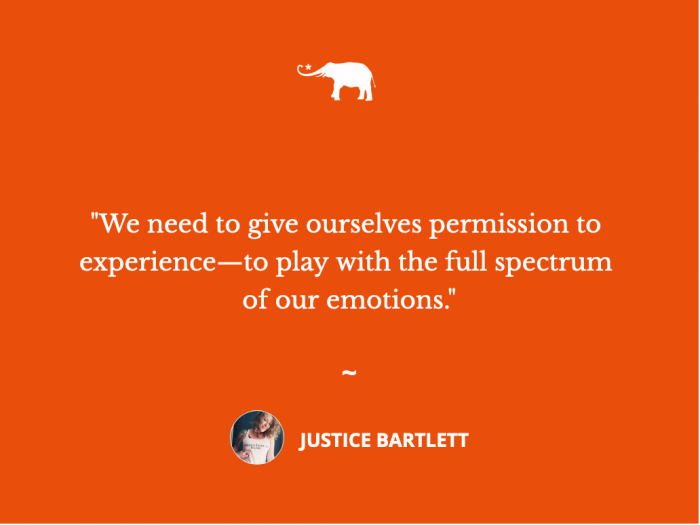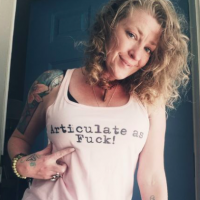F*ck Shame & Should—Let’s Play!
A pulse of energy shoots through my body. The fan and the air purifier are whirring away as I shift restlessly between my sheets.
Grabbing my phone, I check the time: 1:33 a.m. Then I pop on Facebook (a terrible nighttime habit).
I noticed my lover was online and, for a moment, thought about shooting him a message, but I held back. I worry about reaching out too much, needing too much, sharing too much. On the other side of that, I enjoy sending rather risqué photos to him.
Performing can be putting ourselves out there in a contrived way—or it can be holding back.
I’ve lost count of how many times we’ve been naked together, but these concerns—double texting, being too eager, and fearing he won’t respond—shape my behavior more than I would like to admit. The moment passes, as so many do, and I redirect my attention.
Instead, I fired off a response to someone who sent a message regarding a meme I had shared. It was some Victorian reconstitution of a girl taunting a boy to talk dirty to her that ended with him replying, “I’ll smash all the chairs, so the only place you’ll have left to sit is on my face.” (I chortle.)
The message in my inbox: “Girls are so much hornier in their posts than boys are. Really interesting. You would think it would be the opposite.”
My response: “I just like to play.”
Truer words about myself cannot be spoken. I like to play.
I want to play with my lover, with my life, with my work, with my body, with my heart, with my soul, and with my words.
“Play” feels uninhibited—a natural way to express life force, creativity, and even sexuality.
There isn’t a malicious bone in my body. Mischievous? Yes. Protective? Absolutely.
Fierce, tender, loving, intelligent, and sexual are also all attributes that speak to who I am. In there, I will also add insecure and hesitant.
How many of us have heard this at some point in our lives, as children or as adults?
“If you don’t have anything nice to say, don’t say anything at all.”
I once saw a vision of myself—my inner child—on a stage wearing a poofy, scratchy dress that was buttoned all the way up, little black patent shoes, and frilly socks. She was performing. I felt I couldn’t breathe as I took this in. My adult self wanted to help her. In my mind, I pulled her off the stage and stripped this costume from her.
She looked like a doll—a nice little girl.
I am not a nice woman. I can’t be if I want to be alive and in my fullness.
Whenever I hold things back in one arena of my life, it will often come out sideways in another.
A confrontation that needs to be had in one relationship will pop out as agitation with another person. My desire to express a request—when repressed—may get blurted out in the form of some sort of self-sabotaging remark or behavior. That happened recently.
There is something I have been wanting to express to my lover that I kept choking on, freezing over, and holding back. It is a simple thing, a few requests and agreements that I think would create a bit of structure and more ease in our dynamic. Instead of sharing with him what I had wanted to do recently, I blurted out something quite contrary to my desired orientation for us—more closeness, more freedom, more expression.
We’ve all been there: we’ve said something that we wish we wouldn’t have. But, on top of that moment, there is also the after-dialogue—the narrative that we spin about ourselves and what that means. Often, for me, it means I ruined it.
My hand goes to my throat as I read those words on my screen: I ruined it.
My tailbone pulls in. My belly feels tight. How often does this happen with me, I wonder? What happens to the energy that had wanted to be expressed?
We simply cannot “be nice” all the time. Nice is not an emotion. Nice is not a qualification for a human’s character. Nice is, more often than not, a mask.
We learn at an early age what behaviors will lead to the experience of being accepted or of being rejected. We learn, both consciously and through body language and feedback, what emotions are within the acceptable range of expression.
We learn what we should do, be, wear, not wear, say, and not say—all the things to be accepted.
Wherever there is a “should,” or even an implied one, we can be certain that there is an attempt to control emotion or behavior. (Either within us or with another person.) “Should” is also almost always an indication of the presence of shame.
Things we hold back and hold in can be minor infractions to our integrity, or they can serve as major derailers for our genuine desires and needs.
Shame was what I felt after my blurt. It didn’t come on right away. It took a couple of days for my mind to decide that my body had no right to feel good after saying something so contrary to my desires.
When we fall into shaming as an attempt at creating a course correction or as modifying behavior, we actually shut down our ability to feel what we need to feel in order to make new choices.
Wrapping shame around how we feel, how we look, what we want or need, or what we expect of ourselves (or others) is a surefire way to keep the cycle of performance, self-sabotage, depression, anxiety, and other forms of distortion to our vitality active.
So how do we break this cycle?
We need to give ourselves permission to experience—to play with the full spectrum of our emotions and human encounters. When we open up through play, we can shed the shroud of shame and begin to snip the strings on those controlling performative programs.
We need to let ourselves feel repulsed by what we find repulsive, be angry when we are violated, feel hurt when we are in pain, and feel excitement. Then we can also feel what can actually be one of the hardest things to experience: joy.
We hear all the time that joy is our natural state. Yes, absolutely! Joy arises organically when we are genuine—when we are playing, not performing. Joy comes more naturally when I relax, listen to my body, and honor how I want to play.
Play lets us come to life. It says, “Send that message, make that call, take that photo, taste me, feed me, f*ck me, feel me.”
Oh, yeah, let’s play.









Read 30 comments and reply